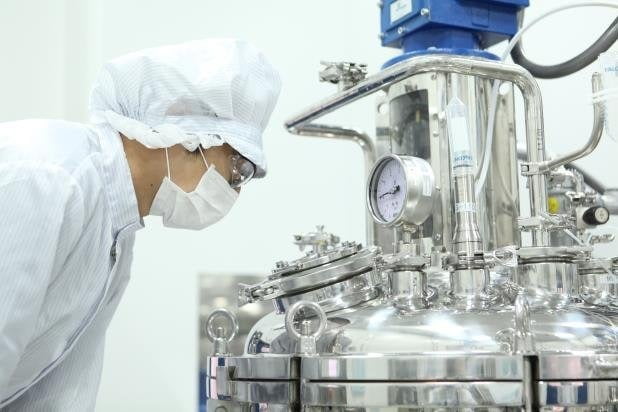World’s best cell therapy platform… 2 yen export to the US hit
Korea’s third largest pharmaceutical company after Hanmi Pharm and Alteogen

Photo = Yonhap News
In the past few years, the gaze at GC Green Cross Lab Cell, a company that develops Green Cross cell therapy products, has not been so fine. Some highly appreciated that they challenged the CAR-NK technology, which is called the’dream anticancer drug’, but the majority shook their heads, saying, “It is a too big goal for a small company on the side to challenge.” There were many skeptical responses in the pharmaceutical industry, saying, “Would such cutting-edge technology ever come out of Korea?”
Green Cross Labcell has made the development of CAR-NK technology, which many people called’reckless challenge’, a reality. It exported the CAR-NK platform technology developed together with the subsidiary Artiva Therapeutics, established in the United States on the 29th, to MSD in the United States for $1.86 billion (about 290 trillion won). In the market, it was evaluated as “a’big deal’ comparable to the condition that the US Pate, the strongest player in the treatment of CAR-NK, transferred the technology to Janssen (3.3 trillion won)” (Huh Hye-min, a researcher at Kiwoom Securities). This is the third time after Hanmi Pharmaceutical (2015 diabetes treatment) and Alteogen (2020 subcutaneous injection) that domestic pharmaceutical companies have exported technology worth over 2 trillion won.
Green Cross Lab Cell exports CAR-NK platform technology such as cell culture. Based on this technology, MSD is developing Green Cross and three solid cancer treatments.
Green Cross Labcell receives $98.175 million (about 1.98 trillion won), half of the total export amount. The other half belongs to Atiba. Green Cross Holdings and Green Cross Lab Cell, which own 19.7% and 10.2% stakes in Atiba, respectively, can expect dividend income. CAR-NK is an anticancer drug in which the gene of natural killer (NK) cells, a kind of innate immune cells extracted from the blood of a healthy person, is engineered to bind to specific cancer cells and then injected into the patient’s body. Compared to CAR-T, which manipulates T cells, another immune cell, it has many advantages, such as fewer side effects, but it is difficult to develop. This is why three CAR-T treatments have been approved for sale, but CAR-NK has not yet been developed.
The pharmaceutical industry points out three things: an eye to read market trends, long-term investments not obsessed with short-term performance, and active collaboration with global companies as the secret of Green Cross Labcell’s’technological export jackpot’.
Platform technology export… Application fields infinite
Actually it was. Considering the speed of technological development, the GC Green Cross Lab Cell is expected to open faster than expected in the CAR-NK era, and it began to develop in earnest from 2014. It was a time when even CAR-T was not commercialized worldwide. Kimlia, the first CAR-T treatment, was approved by the US Food and Drug Administration (FDA) three years ago.
A company official said, “As a result of researching NK cells since 2010, we decided that there was a chance to develop CAR-NK, so we concentrated our capabilities.” The industry explained, “As Hyundai Motor focuses on developing hydrogen cars, the next generation of vehicles, as Hyundai Motors focuses on developing hydrogen vehicles, the next-generation vehicle when the electric vehicle market is saturated, the Green Cross skipped CAR-T and went all-in to CAR-NK.
Having a long breath and working on research and development also played a part. The company explained that it would have been difficult to export 2 trillion won technology if it was not for the management’s decision to invest in uncertainty for over 7 years in a situation where it is difficult to determine the success or not. It is known that Green Cross Labcell has invested more than 20 billion won in the technology development that made this contract. It is not common in the domestic pharmaceutical industry to spend tens of billions of billions of dollars in R&D expenses before even starting a clinical trial.
The final key to the success of technology export was the establishment of the US affiliate Atiba in 2019. After conducting all the research in Korea, it was a completely different move from other pharmaceutical companies looking for overseas partners to hand over the technology.
Green Cross Labcell composed of researchers who performed similar tasks at global bio companies such as Fate and Velicum. That is because it was considered advantageous when exporting technology to global pharmaceutical companies and conducting joint research in the future. An official from Green Cross said, “As this contract is a platform technology that can be applied to various fields, not a specific candidate for a new drug, the scale of export could increase further.”
Reporter Oh Sang-heon/Kim Woo-seop [email protected]
